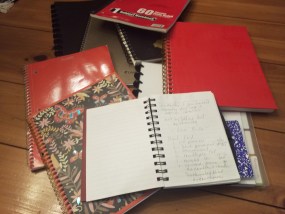
“Google is not a synonym for research,” author Dan Brown famously said. Was he right? Online searches every day number in the tens of billions. Almost any question we think up can be answered in moments on our personal devices, and when a question can’t be answered, we feel personally aggrieved. We’ve become accustomed to instant gratification.
Not so in the olden days. Younger authors—those born in the age of the personal computer—have never experienced the laborious slog through card catalogs, reels of microfiche, and tottering piles of books that may or may not prove relevant in the end. We have the internet, where millions of documents, photographs, archives, and articles hover in the cloud, just waiting for someone to find and access them. And while not everything on the worldwide web is reliable (ha!), today’s researchers are blessed with an embarrassment of technological riches. Not only do we have the internet as a source; we have high-tech computer programs to help us save, organize, sort, and weave the information we find into our plot lines.

But can everything writers need be found on the worldwide web? Of course not. Some things must be experienced, savored, and assimilated the old-fashioned way. Fortunately, we have other tools available to us, and one of my favorites is an ordinary notebook. I carry a notebook everywhere, to record snatches of conversation (yes, I’ve been known to eavesdrop), a new plot idea, an interesting face, a pungent odor—anything I want to remember for later use.

This past spring in Ireland, for example, I discovered Brendan Behan, the Irish poet, novelist, and playwright, once called “the greatest Irish wit since Oscar Wilde.” In my notebook, I jotted down two of his famous quotes: “I’m a drinker with writing problems,” and “The first duty of a writer is to let his country down.” It wasn’t the quotes themselves I wanted to remember as much as Behan’s razor-sharp wit—his way of flipping expectations on their ear. There’s a touch of Behan’s humor in one of my characters, a publican, in A Legacy of Murder (Crooked Lane, available October 8th).
My notebooks (sized to fit into my current handbag) contain all kinds of information—odd facts, questions, musings, potential story lines, small sketches to jog my memory, even interviews. While researching British police procedures for A Legacy of Murder, I spend a day with D. I. Tamlyn Burgess of the Suffolk Constabulary in Bury St. Edmunds, England. Before the day was out, I’d used up the entire notebook. A month later, back in the U.S., I was researching England’s National Trust properties, and—hard as I tried—I couldn’t find the information I needed online. So I set up a telephone interview with Harry Bowels, Chief Operating Officer for The National Trust. An hour later I had the plot angle I needed. And another notebook filled with information.
Some writers prefer to use index cards because they’re easier to sort, but I’m not disciplined enough to pull out a new card every time I want to document something. I’d rather organize later, transferring the information to a Word document. For me, the mental process involved in documentation is completely different than the brainwork required for assimilation and organization. But it all begins with paper and pencil. Low tech. Irreplaceable.
Do
you carry a notebook or index cards? If not, how do you record facts, ideas,
and experiences for later use in your writing? What is the most difficult part
of writing a story set in another time or place?


Notebook!!!! If I carried index cards they’d be strewn from here to eternity…..And there’s no greater joy than returning to a notebook and finding a great idea!
I feel the same way. I have enough trouble organizing my desk without a bunch of note cards flying all over the place. But each to his own!
Great post, Connie! Research is the fun part of writing. As for index cards, I’ll bet you could write for a month filled with who does/doesn’t swear by them and why. Writers are so quirky.
You’re right. Each writer has to devise strategies that work for her. But we’re endlessly fascinated (at least I am) to learn how others do it.